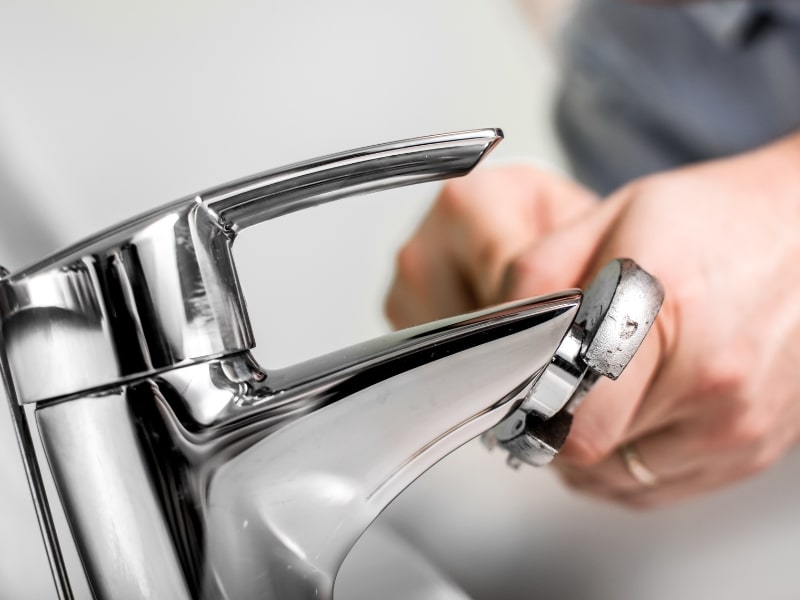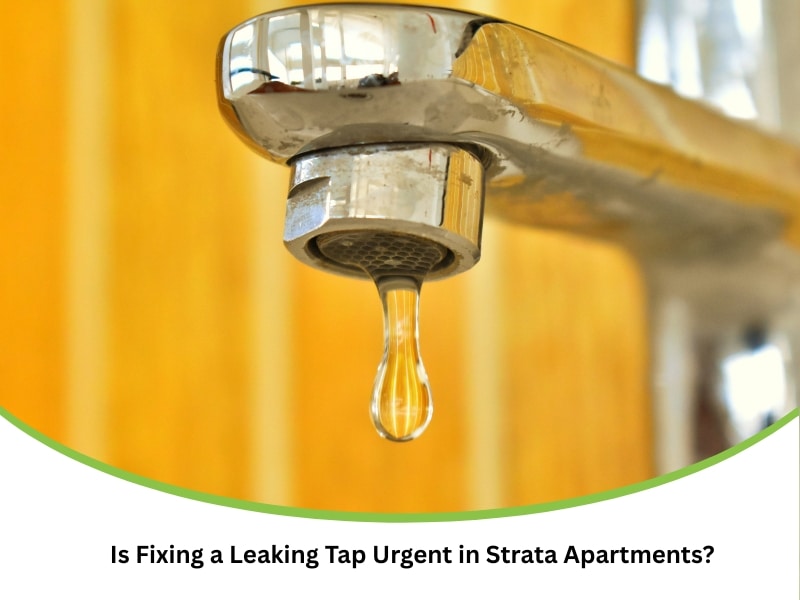Minor plumbing issues are often overlooked, especially in strata living, where decisions can take longer. But the longer you wait, the worse things get. In shared buildings, even a slow drip from a leaking tap can affect multiple units. Fixing a leaking tap promptly is a simple yet crucial step that can prevent unnecessary water waste and avert broader complications. From water damage to disputes between residents, ignoring a faucet leak can quickly spiral out of control. This article explores how addressing leaks promptly can prevent significant structural and financial issues in strata apartments.
What problems can arise from delaying fixing a leaking tap in strata?
Delaying repairs for a leaking tap in strata housing can lead to a range of issues. Shared walls and connected plumbing mean small leaks often spread beyond one unit, affecting others. You’ll also face:
- Increased water bills — even a small drip wastes thousands of litres yearly.
- Water damage to cabinetry, flooring, and shared infrastructure.
- Long-term mould growth may pose health risks.
- Disputes among neighbours over shared repair responsibilities.
Many residents assume a tiny leak is harmless, but this thinking can lead to expensive repair bills. Because plumbing networks are interlinked, a simple tap issue can trigger problems in nearby units. Building managers may then need to coordinate larger repairs, which can prolong the process.
It’s much wiser to find reliable solutions for fixing a leaking tap in strata homes early, before costs and damage multiply across the building.
Why do strata leaks often get worse before they’re fixed?
Leaks in strata properties tend to worsen because identifying the source can be time-consuming and requires coordination. When units share pipes, it’s harder to tell which apartment the leak originated in. You may also need approval from strata managers or committees before arranging repairs. This leads to:
- Delays in accessing internal pipes behind walls or ceilings.
- Disagreements about liability between neighbours and strata bodies.
- Temporary patch jobs that hide symptoms but not causes.
- Damage is spreading behind the scenes while paperwork is processed.
Strata residents often use temporary methods for fixing a leaking tap in the strata while they wait for approvals. These stopgaps might slow the drip, but they rarely fix the underlying issue. Meanwhile, water continues to seep into cavities, damaging shared assets such as fireproofing, insulation, or ceiling plaster.
Can neglecting a dripping tap create bigger problems?
At first, a dripping tap may seem trivial. But it doesn’t take long for that water to cause serious building-wide damage. Over time, neglected leaks wear away seals, encourage corrosion, and build up pressure in jointed areas. The ripple effects can include:
- Rotten timber in vanity units or skirting boards.
- Electrical hazards may occur if leaks come into contact with nearby wires or outlets.
- Pest infestations are drawn to moist environments.
- Rising insurance premiums are expected if water damage becomes frequent.
Persistent plumbing issues are more than inconvenient—they’re costly, time-consuming, and avoidable. When strata managers ignore these problems, they risk extensive repairs and legal breaches due to non-compliance with strata obligations, especially when leaks persist across the property.
Understanding the common causes behind tap and pipe leaks gives strata owners and tenants a head start in addressing these issues. Once you know where issues typically start, it’s easier to act before they escalate into full-scale problems.
How can fixing a leaking tap early prevent structural issues?
Timely intervention doesn’t just save water — it can also protect a building’s core structure. Water travels in unexpected ways, and small leaks often reach critical materials like concrete, plaster, and steel. Preventative benefits include:
- Stopping rust from forming on metal pipe brackets and reinforcement mesh.
- Protecting plasterboard and gyprock from softening and crumbling.
- Preserving paintwork and joint sealants before they discolour or degrade.
- Avoid the weakening of floor joints due to moisture exposure.
It’s easy to forget that buildings — especially older ones — rely on durable materials that react badly to prolonged damp. Wood swells, metal corrodes, and adhesives lose their grip.
By acting early, you reduce both direct damage and the hidden strain placed on shared infrastructure. Preventative plumbing isn’t just good practice — it’s insurance for your property’s long-term condition.

What is the most effective way to repair a leaking tap in strata housing?
Fixing a leaking tap in a strata unit involves more than a quick washer swap. You need to ensure compliance with building rules, obtain permissions, and sometimes hire licensed professionals. To do it right:
- Check if the tap services are common property or private plumbing.
- Notify your strata manager before starting repairs.
- Use a licensed plumber with experience in strata management.
- Replace all worn parts, not just the faulty washer.
Cutting corners might seem faster, but it often leads to repeated issues. In strata housing, a single faulty repair can disrupt services in other units or trigger disputes if water seeps into common areas.
Coordinating with professionals who understand strata setups ensures long-term solutions. Not only is this safer, but it also helps your repair comply with local regulations and strata by-laws.
How do you ensure fixing a leaking tap doesn’t disrupt others?
In shared living environments, courtesy and planning go hand in hand. Tap repairs may require turning off shared water mains or causing noise, which impacts your neighbours. To limit disruption:
- Schedule repairs during off-peak hours when fewer residents are home.
- Inform affected units in advance via email or building noticeboards.
- Limit water shutdowns to short, clear windows.
- Choose plumbers familiar with apartment layouts.
Repairs handled without notice can frustrate neighbours or breach strata rules. When everyone shares water supply lines, a poorly timed repair can shut off water to the entire floor.
Minimise friction by planning. Respecting your neighbours’ time and comfort helps maintain harmony and avoids complaints being raised with building management.
| Disruption Type | Cause | Prevention Tip |
| Water shutdown | Accessing shared plumbing lines | Schedule ahead and notify neighbours |
| Noise | Drilling or tap disassembly | Book during work hours |
| Leaks spreading | Incomplete repair jobs | Hire experienced strata plumbers |
| Confusion | Lack of communication | Leave a clear notice with contact info |
Why is consistent tap maintenance crucial for strata properties?
Strata buildings depend on routine upkeep to stay safe, functional, and liveable. Taps are often overlooked, but consistent maintenance prevents a host of more significant issues from developing. Benefits of ongoing tap care include:
- Spotting worn seals or corrosion before failure.
- Catching leaks early, before they reach other units.
- Extending the lifespan of tapware and plumbing.
- Keeping strata repair budgets under control.
It’s easier to fix a small drip than reverse months of hidden water damage. Proactive checks also help ensure your plumbing remains compliant with local water efficiency standards.
The long-term benefit? Less water waste. Ongoing tap maintenance aligns with broader sustainability goals, including ways to reduce water wastage from indoor leaks. Strata bodies that adopt this approach protect not only their buildings, but also the wider environment.
Final thoughts
When you live in strata housing, even minor plumbing issues need swift action. A dripping tap might not seem urgent, but over time it can lead to higher water bills, damaged structures, and upset neighbours. Taking early steps means fewer hassles and better long-term outcomes for everyone involved.
If you’re unsure where to begin or need guidance tailored to strata settings, discover how Eco Plumbers 24/7 can assist with plumbing needs.

